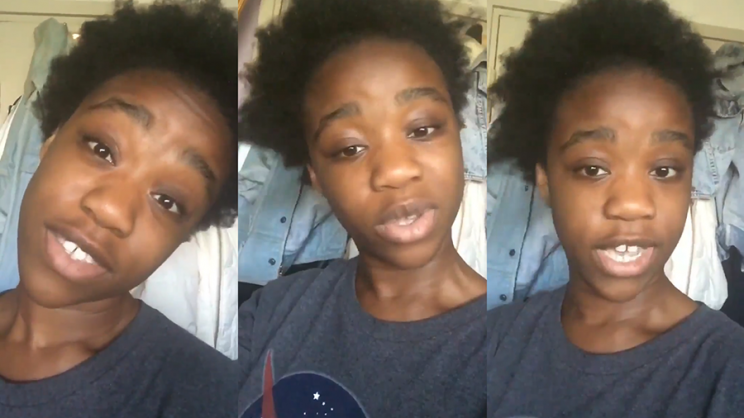This Blogger Is Over Women With ‘Socially Acceptable’ Curls Defining the Natural Hair Community

In recent years, natural hair has been a larger part of beauty conversations than ever before — particularly as women feel more empowered to wear their naturally textured curls and coils. As good as it is to have natural hair in the spotlight, there are deeper issues about what is being defined as “acceptable” natural hair, and some in the community are speaking up about the issue.
On Twitter, award-winning blogger Chidera Eggerue shared a video with a caption that read, “my issue with the natural hair community.” She opens the video by getting straight to the point: “Y’all want to know what I’m mad about today? The fact the natural hair community is dominated by women who have socially acceptable curls, like 3A and 3B, 3C curly hair textures.”
The 22-year-old goes on to say that you rarely see women with hair like her own dominating hair campaigns. In the three-minute video, she touches on how women with tighter curl patterns face different issues and how this ties directly to colorism; she also speaks about the obsession with hair length versus health and says that without more widespread inclusion, no further progress will be made.
my issue with the natural hair community pic.twitter.com/7DExy4dRFU
— THE SLUMFLOWER (@theslumflower) July 9, 2017
Eggerue’s post quickly became wildly popular and has been shared by social media users more than 3,800 times in a matter of a few days. People are thankful that she is speaking out about this underdiscussed reality, and they are saying as much via their comments.
I appreciate u talking on the importance of hair health vs. just aesthetics. That message is always lost. Watching again w/my 4Z daughter. pic.twitter.com/aXrJOmdVPL
— The Hon. Tiffany (@WhoIsTiffIsMe) July 9, 2017
Beautiful. Articulate. Necessary.
— ebonee davis (@eboneedavis) July 9, 2017
Omg preach !!!!!!! I love the fact that you tied this with colorism which I have been saying for the longest. Totally agree pic.twitter.com/LIOWQPlGxv
— Ceeツ (@ChillOnCee) July 9, 2017
Yahoo Beauty spoke with Eggerue and got to the heart of what had inspired her to so publicly share this opinion. “I got extremely tired of seeing the natural hair movement being led by the same type of woman — light-skinned, loose-curled, and fitting a Eurocentric standard of beauty,” she says. “This is problematic because different women of color have different hair textures and different needs, but there is a major lack of representation. Darker-skinned women with thicker hair textures are the least heard.”
In her video, Eggerue brings up colorism — discrimination based on shades of skin tones — a controversial topic that some people feel has nothing to do with the natural hair movement. One person wrote under the initial post, “It’s not that deep. Just find people with 4c hair and network with them and share experiences. It has nothing to do with colorism.” Another quickly responded to that with, “In fact, it is that deep. Everything she said was factual. You speak of ‘building up Africa’ yet you dismiss her personal experience. How.”
Personal experience is a lot of what drives Eggerue’s video and this debate. In the video, she speaks about ways she traumatized her hair as she tried to conform to the natural hair examples she saw in the media. “Due to pressure to conform to having socially acceptable hair, I’ve damaged my hair through relaxers, heat and heavy extensions,” Eggerue says. “As a result, I now have traction alopecia, which is a condition where some of my hair follicles have died, leaving a large bald patch at the front of my head. After a lot of effort to fix it through various natural oils, I’ve realized that it’s irreversible and have made peace with it.”
She goes on to further break down and clarify the posttraumatic impact and societal presence of colorism: “It’s extremely problematic because it means that darker-skinned women like myself who have thicker hair textures feel excluded. For a very young black girl seeing campaigns that exclude her, this can create identity issues and lead to internalized anti-blackness,” she says. “It sounds extreme, but people don’t understand that the little seeds of underrepresentation that are planted through selective advertising eventually sprout into giant bean stalks of self-hate. I used to believe my curls were not ‘curly enough’ because no matter how much product I’d load my hair with, it would never have the shiny, popping, defined curls advertised on the product packaging.”
Another interesting moment in the video is when Eggerue brings up the obsession that people in the natural hair community have with hair length as opposed to hair health. When speaking with Yahoo Beauty, she elaborated more in that topic: “Women with natural hair types would benefit more from focusing on the health of their hair as opposed to length, because with health comes length anyway. Long hair doesn’t necessarily equal healthy hair! The issue with prioritizing hair length over hair health is that it’s often rooted in proving that black women can grow long hair. But long hair is a Eurocentric beauty standard, and we have nothing to prove to anybody.”
This isn’t the first time the Internet has lit up in debate over how much more looser curls are celebrated as opposed to kinkier, tighter coils, and it probably won’t be the last. There is obviously still a noticeable lack of balanced representation, and people are fed up.
Read more from Yahoo Style + Beauty:
Dads, Daughters, and Natural Hair Star in This Precious Film From a Former NFL Player
The Big Debate: Have ‘Mixed Women’ Hijacked the Natural Hair Movement?
Follow us on Instagram, Facebook, and Pinterest for nonstop inspiration delivered fresh to your feed, every day. For Twitter updates, follow @YahooStyle and @YahooBeauty.

